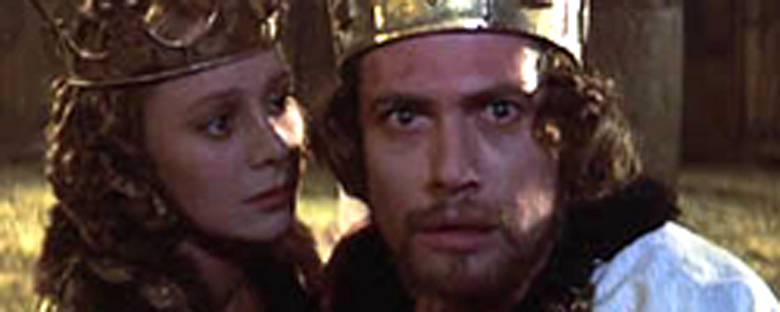Reviews
The Tragedy of Macbeth
Roman Polanski
UK / USA, 1971
Credits
Review by Leo Goldsmith
Posted on 30 October 2004
Source Columbia Tristar DVD
Related articles
features: October: 31 Days of Horror
Part of the fun of watching a horror film is having the vicarious experience of being hounded and dismembered by a madman or supernatural ghoul (or else dismembering an innocent victim yourself) with minimal physical, emotional, or psychological risk. In a society that has largely sanitized its more brutal elements, the spectacle of the horror movie affords a rare and exotic experience of fear without consequence.
By this token, Roman Polanski’s film version of The Tragedy of Macbeth is perhaps the least fun horror movie ever made. Released just two years after Polanski’s then pregnant wife, Sharon Tate, was brutally stabbed to death by members of the Manson “family”, the film is morbidly preoccupied with the subject of violence and cruelty. Following the bloody ascendancy of the titular despot, Macbeth seems perversely intent upon dissecting the psychology of its murderous protagonist and bringing about his brutal demise.
The film’s script (by critic Kenneth Tynan and Polanski himself) is a faithful, but smartly cinematic reading of Shakespeare’s most concise play, consolidating scenes and characters and utilizing an array of photographic and editing tricks. But the film’s most unusual innovation is its direct depiction of the murder of Duncan, which occurs offstage in the play, but is here portrayed from Macbeth’s point of view in all its bloody detail.
With its apparent fixation on murder and cruelty, it is difficult to overlook a number of the unsettling autobiographical details in the film. In particular, the murder of Macduff’s family, surprised by Macbeth’s thugs while the head of the household is away, bears horrifying similarities to the murder of Polanski’s wife and friends. Even the detail of Macduff’s birth—“from my mother’s womb untimely ripp’d”—has weird correlations to Tate’s murder (Manson’s followers wanted to present the fetus of Tate’s child to their leader as a gift) and is presented onscreen in Macbeth’s premonitions.
But for all of these grisly parallels, it is curious how sympathetic the character of Macbeth is in both the play and the film. Shakespeare’s character is a tragic pawn of supernatural forces, a manipulative spouse, and his own unscrupulous ambition. While Polanski deemphasizes Lady Macbeth’s role in her husband’s murderous rise to power, the film nonetheless still portrays Macbeth as the unwitting recipient of a tragic, human fate.
Still, Polanski’s Macbeth is the vehicle (however human or powerless) of a pure evil that needs to be stopped and, more importantly, avenged. The film adopts and analyzes the murderer’s perspective, but it still demands his destruction. This task is performed by the aggrieved Macduff, who voices the need for a cathartic vengeance: “If thou beest slain and with no stroke of mine,/ My wife and children’s ghosts will haunt me still.”
We don’t do comments anymore, but you may contact us here or find us on Twitter or Facebook.



